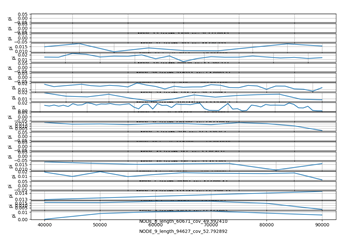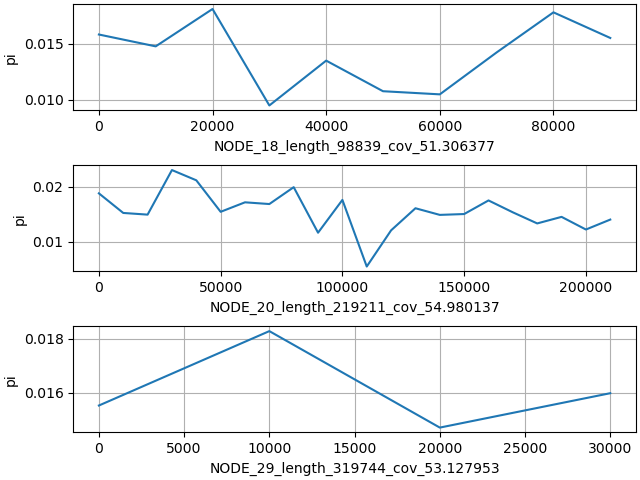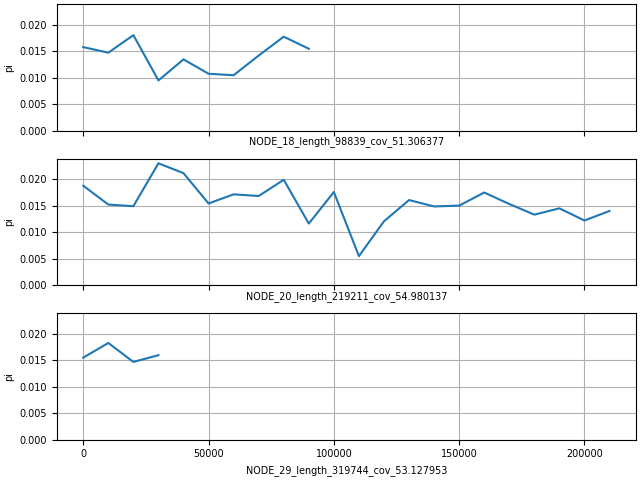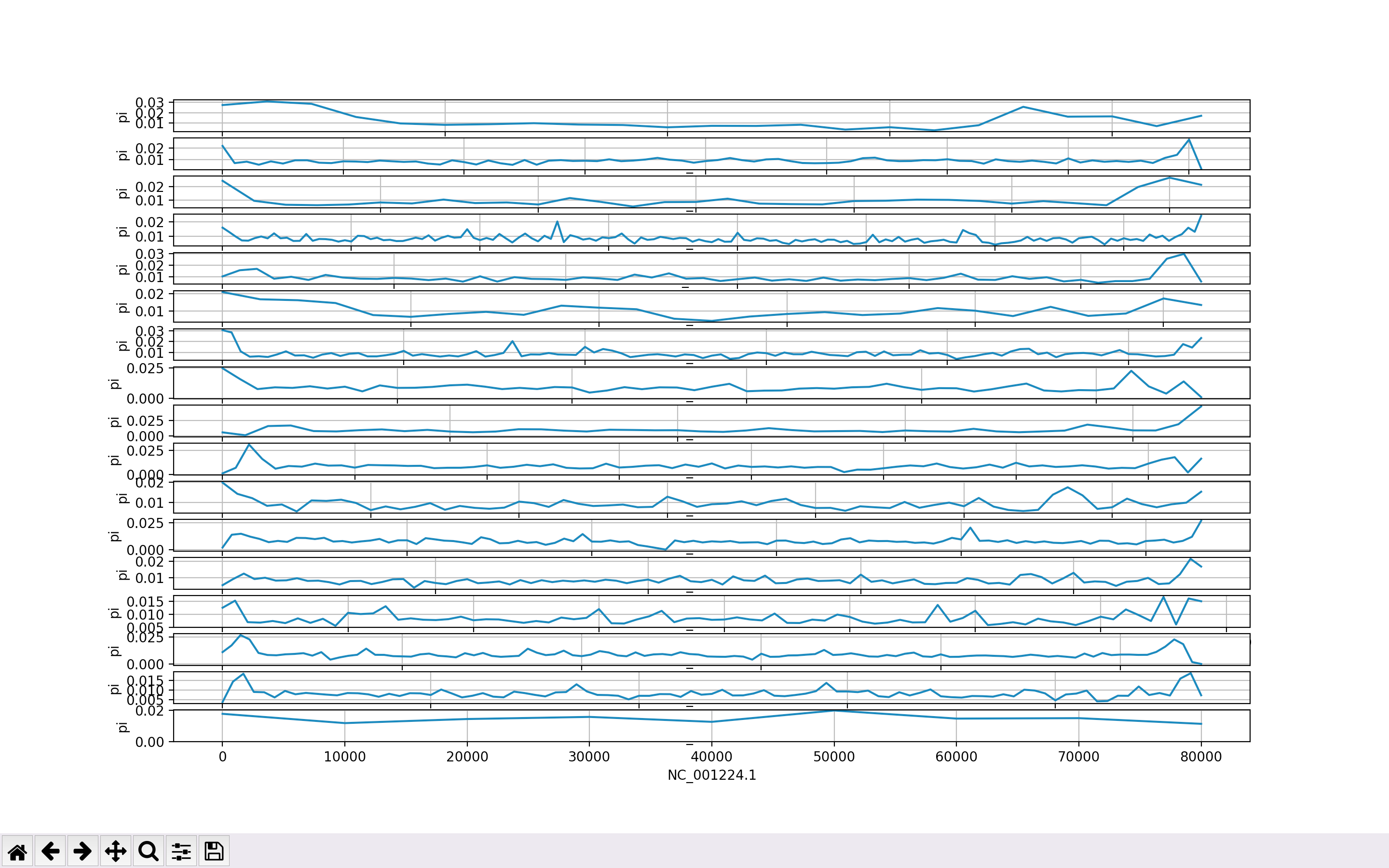多个子图的矩阵库
多个子图的矩阵库
提问于 2021-04-29 09:47:17
我想用以下数据绘制多面板图:
CHROM BIN_START BIN_END N_VARIANTS PI
NODE_10_length_497_cov_170.299805 1 10000 39 0.000703581
NODE_13_length_1438_cov_357.659943 1 10000 61 0.00132786
NODE_15_length_733_cov_44.686222 1 10000 25 5.73165e-05
NODE_16_length_8151_cov_58.001228 1 10000 525 0.0129994
NODE_18_length_98839_cov_51.306377 1 10000 753 0.0158054
NODE_18_length_98839_cov_51.306377 10001 20000 644 0.0147527
NODE_18_length_98839_cov_51.306377 20001 30000 783 0.0180735
NODE_18_length_98839_cov_51.306377 30001 40000 433 0.00950069
NODE_18_length_98839_cov_51.306377 40001 50000 568 0.0134851
NODE_18_length_98839_cov_51.306377 50001 60000 634 0.0107662
NODE_18_length_98839_cov_51.306377 60001 70000 501 0.0104874
NODE_18_length_98839_cov_51.306377 70001 80000 736 0.0142129
NODE_18_length_98839_cov_51.306377 80001 90000 803 0.0177756
NODE_18_length_98839_cov_51.306377 90001 100000 683 0.015499
NODE_20_length_219211_cov_54.980137 1 10000 803 0.0188128
NODE_20_length_219211_cov_54.980137 10001 20000 577 0.0152466
NODE_20_length_219211_cov_54.980137 20001 30000 596 0.0149394
NODE_20_length_219211_cov_54.980137 30001 40000 982 0.0230532
NODE_20_length_219211_cov_54.980137 40001 50000 991 0.0211885
NODE_20_length_219211_cov_54.980137 50001 60000 659 0.0154533
NODE_20_length_219211_cov_54.980137 60001 70000 752 0.0171805
NODE_20_length_219211_cov_54.980137 70001 80000 725 0.0168676
NODE_20_length_219211_cov_54.980137 80001 90000 836 0.0199372
NODE_20_length_219211_cov_54.980137 90001 100000 652 0.0116497
NODE_20_length_219211_cov_54.980137 100001 110000 788 0.0176188
NODE_20_length_219211_cov_54.980137 110001 120000 278 0.00549361
NODE_20_length_219211_cov_54.980137 120001 130000 499 0.0120812
NODE_20_length_219211_cov_54.980137 130001 140000 738 0.0161006
NODE_20_length_219211_cov_54.980137 140001 150000 729 0.0148927
NODE_20_length_219211_cov_54.980137 150001 160000 611 0.015047
NODE_20_length_219211_cov_54.980137 160001 170000 737 0.0175226
NODE_20_length_219211_cov_54.980137 170001 180000 709 0.0153575
NODE_20_length_219211_cov_54.980137 180001 190000 688 0.0133387
NODE_20_length_219211_cov_54.980137 190001 200000 693 0.0145321
NODE_20_length_219211_cov_54.980137 200001 210000 564 0.0122298
NODE_20_length_219211_cov_54.980137 210001 220000 687 0.0140385
NODE_22_length_248_cov_293.927429 1 10000 23 0.000482139
NODE_24_length_104_cov_29.778847 1 10000 6 2.73246e-05
NODE_29_length_319744_cov_53.127953 1 10000 759 0.0155234
NODE_29_length_319744_cov_53.127953 10001 20000 741 0.0182896
NODE_29_length_319744_cov_53.127953 20001 30000 709 0.0147025
NODE_29_length_319744_cov_53.127953 30001 40000 755 0.0159811
.
.
.我使用了下面的python代码。
import matplotlib.pyplot as plt
chrs = {}
with open('diversity_level.windowed.pi', 'r') as f:
info = f.readlines()
for i in range(2, len(info)):#skip the first line
linfo = info[i].split("\t")
if (linfo[0] in chrs):
chrs[linfo[0]][0].append(int(linfo[1]))
chrs[linfo[0]][1].append(float(linfo[4]))
else:
chrs[linfo[0]] = [[] for i in range(2)]
fig, axs = plt.subplots(len(chrs), 1)
fig.subplots_adjust(wspace=50,hspace=0.1)
i = 0
for chr, data in chrs.items():
axs[i].plot(data[0], data[1])
axs[i].set_xlabel(chr)
axs[i].set_ylabel('pi')
axs[i].grid(True)
i = i + 1
plt.show()得到的结果是

请允许我知道如何调整代码中的参数,以便可以看到每个子图的X轴标签。如何选择不输出空子图。提前感谢
对于gobffi来说,由于所有的数据都在文件多样性_header.windowed.pi中,我如何读取文件中的数据(没有头),并将其放入字典来绘制子图?
from matplotlib.pyplot import show, subplots
data_dict = {}
with open('diversity_level.windowed.pi', 'r') as f:
data= f.readlines()
for record in range(1,len(data)): #skip the first line header
key, start, pi = record[0], int(record[1]), float(record[4])
start_list, pi_list = data_dict.get(key, [[],[]])
start_list.append(start), pi_list.append(pi)
data_dict[key] = [start_list, pi_list]
for key in list(data_dict.keys()):
if len(data_dict[key][0])==1: data_dict.pop(key)
fig, axs = subplots(len(data_dict), constrained_layout=1,
sharex=True, sharey=True)
for ax, (key, (start_list, pi_list)) in zip(axs, (data_dict.items())):
ax.plot(start_list, pi_list)
ax.set_xlabel(key, size='x-small')
ax.set_ylabel('pi', size='x-small')
ax.tick_params(axis='both', labelsize='x-small')
ax.grid(1);
ax.set_ylim(bottom=0.0)
show()回答 2
Stack Overflow用户
回答已采纳
发布于 2021-04-29 10:59:22
这里是我的尝试,请注意,我对您的代码进行了一些重新组织,因为我感到您使用的索引太多了。
- 要删除“空”序列,我会在键上循环,如果序列的长度正好是1,我就删除(即
pop)相应的字典条目。 - 要解决狭小的图形问题,通常一个好主意是指定图形必须尊重
constrained_layout(这是一个相对较新的特性,imho,确实缺少了这个特性!)
。
from matplotlib.pyplot import show, subplots
# iterate over the lines of a file opened for reading
# each line is a record
data = [record.split() for record in open('your_file_name', 'r')]
data_dict = {}
# we iterate on all the records, except the first one (Python counts from 0)
for record in data[1:]:
# unpack the "interesting" stuff
key, start, pi = record[0], int(record[1]), float(record[4])
# get what is inside the dictionary item, using unpacking
# if item is "new" we get the default value, that is two empty lists
start_list, pi_list = data_dict.get(key, [[],[]])
# append the values to the respective lists
start_list.append(start), pi_list.append(pi)
# update the dictionary item with the augmented lists
data_dict[key] = [start_list, pi_list]
# we remove the "non interesting" entries from the dictionary
# using the `.pop()` method
# note the use of `list(...)` to have a static reference to the keys
for key in list(data_dict.keys()):
if len(data_dict[key][0])==1: data_dict.pop(key)
# instantiate the figure and the axes, using `constrained_layout`
# usually leads to a better arrangement of the figure elements
fig, axs = subplots(len(data_dict), constrained_layout=1)
# except for a moderate abuse of the unpacking syntax,
# everything should be clear …
for ax, (key, (start_list, pi_list)) in zip(axs, (data_dict.items())):
ax.plot(start_list, pi_list)
ax.set_xlabel(key)
ax.set_ylabel('pi')
ax.grid(1);
show()

关于这个主题,如果必须对数据实例进行比较,我希望在每个子图中有相同的轴(因此是sharex和shareyin子图`),并且在这个特殊情况下,将下限y设置为零;而且,由于这个数字相当繁忙,这里我将向您展示如何缩小标签和滴答标签的大小。
...
fig, axs = subplots(len(data_dict), constrained_layout=1,
sharex=True, sharey=True)
for ax, (key, (start_list, pi_list)) in zip(axs, (data_dict.items())):
ax.plot(start_list, pi_list)
ax.set_xlabel(key, size='x-small')
ax.set_ylabel('pi', size='x-small')
ax.tick_params(axis='both', labelsize='x-small')
ax.grid(1);
ax.set_ylim(bottom=0.0)
show()

Stack Overflow用户
发布于 2022-06-13 13:37:30
由于这是一项任务,以下是完整数据的图片:

因此,上述所有代码如下:
from matplotlib.pyplot import show, subplots
# iterate over the lines of a file opened for reading
# each line is a record
data = [record.split() for record in open('diversity_level.windowed.pi', 'r')]
data_dict = {}
# we iterate on all the records, except the first one (Python counts from 0)
for record in data[1:]:
# unpack the "interesting" stuff
key, start, pi = record[0], int(record[1]), float(record[4])
# get what is inside the dictionary item, using unpacking
# if item is "new" we get the default value, that is two empty lists
start_list, pi_list = data_dict.get(key, [[],[]])
# append the values to the respective lists
start_list.append(start), pi_list.append(pi)
# update the dictionary item with the augmented lists
data_dict[key] = [start_list, pi_list]
# we remove the "non interesting" entries from the dictionary
# using the `.pop()` method
# note the use of `list(...)` to have a static reference to the keys
for key in list(data_dict.keys()):
if len(data_dict[key][0])==1: data_dict.pop(key)
# instantiate the figure and the axes, using `constrained_layout`
# usually leads to a better arrangement of the figure elements
fig, axs = subplots(len(data_dict), constrained_layout=1)
# except for a moderate abuse of the unpacking syntax,
# everything should be clear
for ax, (key, (start_list, pi_list)) in zip(axs, (data_dict.items())):
ax.plot(start_list, pi_list)
ax.set_xlabel(key)
ax.set_ylabel('pi')
ax.grid(1);
ax.set_ylim(bottom=0.0)
show()页面原文内容由Stack Overflow提供。腾讯云小微IT领域专用引擎提供翻译支持
原文链接:
https://stackoverflow.com/questions/67314932
复制相关文章
相似问题

